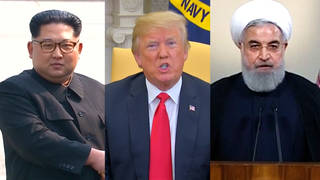
Amy Goodman and Denis Moynihan
In 1971, Daniel Ellsberg released the Pentagon Papers, thousands of pages of the Pentagon’s secret history of U.S. involvement in Vietnam, exposing the government’s lies and helping to end the war. President Richard Nixon’s national security adviser, Henry Kissinger, called Ellsberg “the most dangerous man in America.”
Now at 86 years old, Ellsberg is revealing for the first time that the Pentagon Papers were not the first classified documents that he removed from his secure workplace. In his new book, The Doomsday Machine: Confessions of a Nuclear War Planner, he details his early years at the Pentagon, and why he took thousands of pages of U.S. nuclear war plans describing the lunacy of the U.S. nuclear war policy over 55 years ago. What he discovered is frighteningly relevant today.
Last July 20 at the Pentagon, President Donald Trump reportedly shocked the military staff gathered to brief him on national security issues by suggesting he wanted to increase the nuclear arsenal tenfold. It was after that meeting that Secretary of State Rex Tillerson is said to have called Trump a “f-ing moron.” In August, NBC’s Joe Scarborough, citing an unnamed source, said Trump asked a foreign-policy adviser about using nuclear weapons. Scarborough said: “Three times [Trump] asked about the use of nuclear weapons. Three times he asked at one point if we had them why can’t we use them?” For over 70 years, the president has held the enormous power to launch nuclear weapons, but only one has used it: Harry Truman, ordering the dropping of two atomic bombs over Hiroshima and Nagasaki, Japan, killing hundreds of thousands of people. Trump, who seems to relish saber rattling and antagonizing opponents like the supreme leader of nuclear-armed North Korea, Kim Jong Un, may be pushing us to the brink of nuclear war.
Describing President Dwight Eisenhower’s nuclear war plans, which Ellsberg was tasked with improving in the early months of the Kennedy administration, the whistleblower told us on the Democracy Now! news hour: “They were insane. They called for first-strike, all-out war … for hitting every city — actually, every town over 25,000 — in the USSR and every city in China. … The captive nations, the East Europe satellites in the Warsaw Pact, were to be hit in their air defenses, which were all near cities, their transport points, their communications of any kind. So they were to be annihilated as well.”
Ellsberg recalled how, in 1961, the Joint Chiefs of Staff matter-of-factly predicted casualties of over 600 million people globally, when the world population was only 3 billion. “Six hundred million, that was a hundred Holocausts. And when I held the piece of paper in my hand that had that figure, that they had sent out proudly, to the president — 'Here’s what we will do' — I thought, 'This is the most evil plan that has ever existed. It’s insane.'”
Ellsberg was summoned to the Pentagon to help manage the Cuban missile crisis in 1962, considered the closest humanity has come to nuclear annihilation. His personal experience there informs his opinion on Trump’s antagonism toward North Korea. The nuclear arsenals of both countries, he says, are “being pointed by two people who are giving very good imitations of being crazy. That’s dangerous. I hope they’re pretending. … But to pretend to be crazy with nuclear weapons is not a safe game. It’s a game of chicken. Nuclear chicken.”
Despite widespread concern with Trump’s mental stability, he remains in control of the world’s most powerful nuclear arsenal. He has promised to rain “fire and fury” on North Korea. U.S. Air Force Gen. John Hyten, commander of U.S. Strategic Command, who oversees the entire nuclear arsenal, assured the audience at a public forum in November that “we’re not stupid,” that he would reject an illegal order from Trump to launch a nuclear attack.
Not satisfied to leave the check on Trump to the generals, the Senate Committee on Foreign Relations held a hearing Nov. 14 to consider changing the law to forbid the president, alone, from being able to launch a nuclear attack. Republican Sen. Bob Corker of Tennessee, who has publicly stated his fear that Trump may start World War III, chaired the hearing. Democratic Sen. Chris Murphy of Connecticut summed up the hearing’s intent, saying, “We are concerned the president of the United States is so unstable, is so volatile, has a decision-making process that is so quixotic, that he might order a nuclear weapon strike that is wildly out of step with U.S. national security interests.”
We are closer to nuclear war than we have been in many decades, which is why Daniel Ellsberg’s example as a whistleblower and his call for people in government to expose current doomsday plans are more important than ever.











Media Options